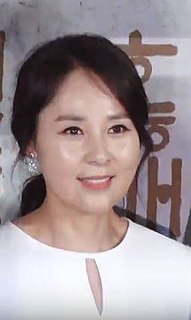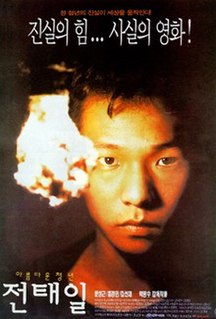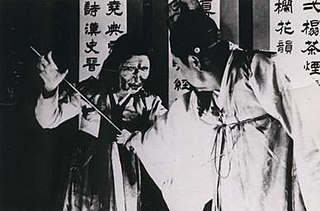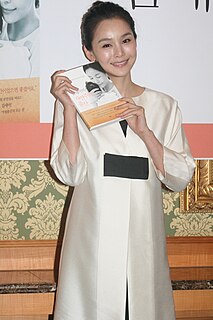A stepmother is a woman who enters one's family by marrying one's parent. Children from her spouse's previous unions are known as her step-children.

A Tale of Two Sisters is a 2003 South Korean psychological horror-drama film written and directed by Kim Jee-woon. The film is inspired by a Joseon Dynasty era folktale entitled Janghwa Hongryeon jeon, which has been adapted to film several times. The plot focuses on a recently released patient from a mental institution who returns home with her sister, only to face disturbing events between her stepmother and the ghosts haunting their house - all of which are connected to a dark past in the family's history.
Korean horror films have been around since the early years of Korean cinema, however, it was not until the late 1990s that the genre began to experience a renewal. Many of the Korean horror films tend to focus on the suffering and the anguish of characters rather than focus on the explicit "blood and guts" aspect of horror. Korean horror features many of the same motifs, themes, and imagery as Japanese horror.

Jeon Do-yeon is a South Korean actress. She won Best Actress at the 60th Cannes Film Festival, making her the first and only Korean ever to win an acting award at the prestigious film festival, and Best Performance by an Actress at the 1st Asia Pacific Screen Awards for her performance in Lee Chang-dong's 2007 film Secret Sunshine. Although she is not as broadly popular with the audiences as some other stars in South Korea due to her film choices, Jeon is widely respected and celebrated for her acting abilities, and many young actresses have cited her as a role model.
Janghwa Hongryeon jeon is a Joseon-era Korean folktale.

The Uninvited is a 2009 American psychological horror film directed by the Guard Brothers and starring Emily Browning, Elizabeth Banks, Arielle Kebbel, and David Strathairn. It is a remake of the 2003 South Korean horror film A Tale of Two Sisters, which is in turn one of several film adaptations of the Korean folk tale Janghwa Hongryeon jeon. The film received mixed reviews.

Jeon Mi-seon was a South Korean actress. Though best known as a supporting actress in films and television series such as Memories of Murder (2003), Moon Embracing the Sun (2012), and Hide and Seek (2013), Jeon Mi-seon also played the leading role in Love Is a Crazy Thing (2005).

A Single Spark is a 1995 South Korean drama film directed by Park Kwang-su.

Story of Janghwa and Hongryeon is a 1936 Korean silent film. The film is based on a popular Korean fairy tale "Janghwa Hongryeon jeon" which had been adapted into film versions in 1924, 1936, 1956, 1962 and 1972, 2003, and 2009.
The Story of Jang-hwa and Hong-ryeon is a 1962 South Korean film directed by Jeong Chang-hwa. The film is based on a Korean folklore story called Janghwa Hongryeon jeon which had been adapted into film versions in 1924, 1936, 1956, 1962, 1972, 2003, and 2009.

Janghwa Hongryeonjeon jeon is 1972 South Korean Horror film. The film is based on a popular Korean fairy tale "Janghwa Hongryeon jeon" which had been adapted into film versions in 1924, 1936, 1956, 1962, 1972, 2003, and 2009.

Janghwa Hongryeonjeon is 1956 South Korean horror film. The film is based on a popular Korean fairy tale "Janghwa Hongryeon jeon" which had been adapted into film versions in 1924, 1936, 1956, 1962, 1972, 2003, and 2009.
Jang-hwa and Hong-ryeon is a 1924 Korean silent film, the first feature film produced entirely by Korean filmmakers. The film is based on a popular Korean fairy tale Janghwa Hongryeon jeon which had been adapted into film versions in 1924, 1936, 1956, 1962 and 1972. Park seung pil was byeonsa for this film.

Yoon Hae-young is a South Korean actress. She began acting after passing the SBS Open Auditions in 1993, and has starred in television dramas such as See and See Again (1998), This Is Love (2001), Elephant (2008), The Tale of Janghwa and Hongryeon, Special Task Force MSS (2011) and I Like You (2012).
A Tale of Two Sisters or Tale of Two Sisters may refer to:
Chang-Wha Chung is a South Korean film director, producer and screenwriter. Chung made his directorial debut with The Final Temptation (1953) and gained attention only when he released A Sunny Field in 1960. During the 1960s he started collaborating with the Hong Kong film industry. In 1968, he joined Shaw Brothers and directed martial arts classics such as King Boxer (1972). He moved to Golden Harvest in 1973, where he directed numerous productions until he returned to South Korea in 1977 to continue his career.
Jeon Sungtae is a South Korean writer.

Kim Se-ah is a South Korean actress and model. She is known for roles in dramas such as Seoul 1945, Janghwa Hongryeon jeon and Who Are You: School 2015.









